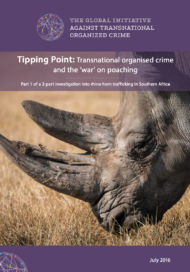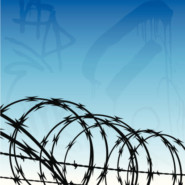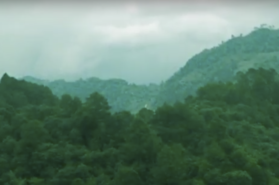Posted on 10 Jun 2014
Abajo la versión en español
The UN Security Council has noted on several occasions that ‘charcoal exports from Somalia are a significant revenue source for Al Shabaab and also exacerbate the humanitarian crisis’. Recent estimates by the Monitoring Group on Somalia and Eritrea are that upwards of 40% of Al Shabaab’s funding comes from various forms of involvement with the illegal Somali charcoal trade. There are indications that this has not substantially changed over the course of 2013, nor so far in 2014.
It is certain that the bulk of the illegal Somali charcoal trade is carried from Somali ports on vessels registered in other States, so the trade is very clearly part of a broader transnational criminal enterprise that extends well beyond the activities of Al Shabaab and others inside Somalia itself. Nor does the illicit trade have only transnational organised crime dimensions – charcoal production creates massive deforestation and desertification problems, which in turn reduces the available grazing land for livestock, the dominant Somali export industry.
The UNSC has responded by placing a sanctions regime around the import of illegal Somali charcoal. However, this sanctions regime has three primary weaknesses:
a. It has not been applied over exports, thus it does not directly authorise any international action (in conjunction with the Somali Federal Government – SFG) in terms of interdicting illegal Somali charcoal shipments at the point of export;
b. The sanctions regime relies upon SFG implementation on the Somali export side of the trade, but the SFG has to date been unable to make significant inroads into this issue – understandable given the many other severe security and governance challenges it currently faces; and
c. The import sanctions regime does not appear to be enforced in importing States on a systematic and comprehensive basis, meaning that it does not yet appear to have sponsored any substantial reduction in the trade.
So what is to be done?
There are a few immediate steps the international community might consider. The first is to engage in a detailed fact finding and analysis exercise, aimed at enhancing the important work carried out by – amongst others – the Monitoring Group, in trying to get to grips with the scope the illegal Somali charcoal trade and the networks that facilitate it.
The next step, on the basis of such mapping and analysis, should be to bring to the attention of States the names of businesspeople, companies, vessels and so on that carry their flag or nationality, but which are engaged in this illicit trade. While demand outside Somalia continues, and sanctions on imports are haphazardly applied or not honoured at all, the trade will continue to seek and find a degree of impunity born of official inaction. States other than Somalia need to step up to their responsibilities to Somalia, and to the international community. Concurrently, however, the international community must also invest in meaningful alternative livelihood programmes to support subsistence Somali tree-cutters who currently survive only through this trade. Just as eradicating poppy fields in Afghanistan without meaningful alternative livelihood options produced less than ideal results, the same dynamic needs to be factored in as we consider the Somali charcoal conundrum.
Third, the UN Security Council should consider strengthening the sanctions regime so as to authorise maritime interdiction operations to seize sanctions-busting vessels and cargo as they depart Somali ports – as has been the case with sanction regimes in relation to Iraq and the Former Yugoslavia, for example. The sanctions regime is already mandatory and carries UN Charter Chapter VII authority; the additional step of extending international authority to implement the sanctions regime at the point of export as well is certainly within the realms of possibility.
Somalia faces many challenges right now. It will face many more in the next decade. Ought we not be doing all we can to mitigate, even if just a little, this deforestation and desertification catastrophe Somalia now faces as well?
_________________________________________________________________
La problemática del carbón: los esfuerzos por detener el comercio ilegal de carbón en Somalia
El Consejo de Seguridad de la ONU ha hecho notar en varias oportunidades que “las exportaciones de carbón desde Somalia son una fuente de financiación significativa para Al Shabaab, al mismo tiempo que acentúa la crisis humanitaria”. Estadísticas recientes difundidas por el Grupo de Control sobre Somalia y Eritrea (Monitoring Group on Somalia and Eritrea) señalan que más del 40% del financiamiento de Al Shabaab proviene, de algún modo u otro, del comercio ilegal de carbón en Somalia. Hay evidencias que indican que esta situación se mantuvo prácticamente sin modificaciones durante el 2013 y que, hasta la fecha, no ha habido cambios sustanciales.
Está confirmado que la mayor parte del comercio ilegal de carbón en Somalia es transportado desde puertos somalíes en buques registrados en otros países, por lo que claramente el tráfico forma parte de una asociación criminal transnacional mucho más amplia que se extiende más allá de las actividades de Al Shabaab y otras que ocurren dentro de la propia Somalia. El comercio ilícito no sólo constituye una actividad delictiva transnacional organizada: la producción de carbón genera una deforestación masiva y problemas de desertificación que, a su vez, reducen los pastizales necesarios para la cría de ganado, la principal industria exportadora somalí.
El Consejo de Seguridad de la ONU ha respondido mediante la implementación de un régimen de sanciones sobre la importación ilegal de carbón proveniente de Somalia. No obstante, este régimen tiene tres debilidades principales:
a. No fueron contempladas las exportaciones, por lo que no autoriza directamente ninguna acción internacional (en conjunto con el Gobierno Federal Somalí – GFS) que prohíba la salida de cargamentos ilegales de carbón somalí al momento de su exportación;
b. El régimen de sanciones depende de la acción del GFS al momento de la exportación, pero, hasta la fecha, el Gobierno Somalí no ha hecho grandes avances en este campo –hecho que es entendible dada la cantidad de desafíos que enfrenta en materia de seguridad y gobierno;
c. El régimen de sanciones a importaciones no parece aplicarse en países importadores de manera amplia y sistemática, lo que significa que no parece haber producido aún una reducción sustancial de este tipo de comercio.
¿Qué puede hacerse, entonces?
Hay una serie de medidas inmediatas que la comunidad internacional podría considerar. La primera está relacionada con la verificación y análisis detallados de la información a los fines de mejorar los importantes trabajos llevados a cabo por, entre otros, el Grupo de Control destinados a controlar el comercio ilegal de carbón en Somalia y las redes que lo facilitan.
La segunda medida sería, en base al esquema y análisis anterior, hacerle saber a los Estados los nombres de los empresarios, empresas, buques y otros, que llevan la bandera o nacionalidad de su país y están involucrados en el comercio ilícito. Mientras la demanda exterior de carbón de Somalia continúe y las sanciones sobre importaciones se apliquen al azar -o no se respeten en lo absoluto-, el comercio seguirá buscando y encontrando la impunidad gestada en la inacción oficial. Los Estados deben tomar mayor responsabilidad sobre Somalia y sobre la comunidad internacional. La comunidad internacional también debe invertir en programas valiosos de formas alternativas de sustentabilidad para apoyar a los taladores de árboles Somalíes que hoy sobreviven sólo gracias a este tipo de comercio. Del mismo modo que la erradicación de campos de amapola en Afganistán sin un programa alternativo de sustentabilidad produjo un resultado muy alejado del ideal, la misma dinámica debe tenerse en cuenta en la problemática del comercio de carbón en Somalia.
Como tercera medida, el Consejo de Seguridad de la ONU debería considerar fortalecer el régimen de sanciones a los fines de autorizar la interdicción marítima a los buques y transportes de carga que estén quebrantando la ley en el momento en que salen de los puertos somalíes –como fue el caso con el régimen de sanciones en relación a Irak y la ex Yugoslavia, por ejemplo. El régimen de sanciones ya es de cumplimiento obligatorio conforme el Capítulo VII de la Carta de la ONU. Extender esta autoridad internacional a efectos de implementar el régimen de sanciones al momento de las exportaciones también se encuentra dentro de la esfera de las posibilidades.
Somalia se encuentra hoy frente a varios desafíos, y se enfrentará a muchos más durante la próxima década. ¿No deberíamos hacer todo lo que está a nuestro alcance, por pequeño que sea, para mitigar la deforestación y desertificación catastróficas a la que también se encuentra expuesta Somalia?



